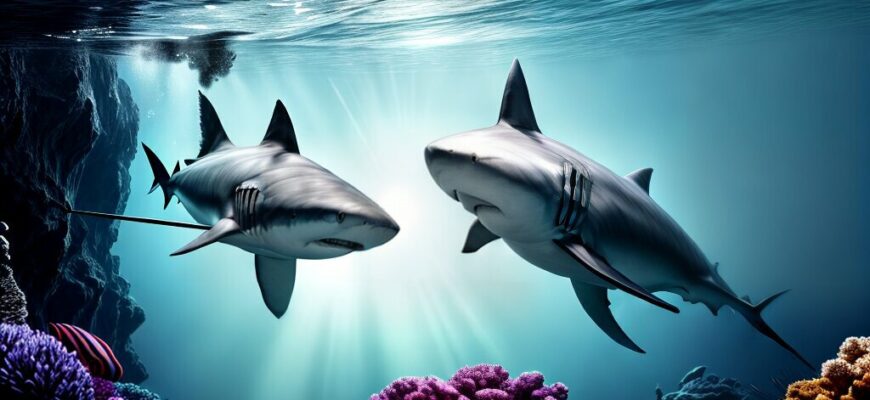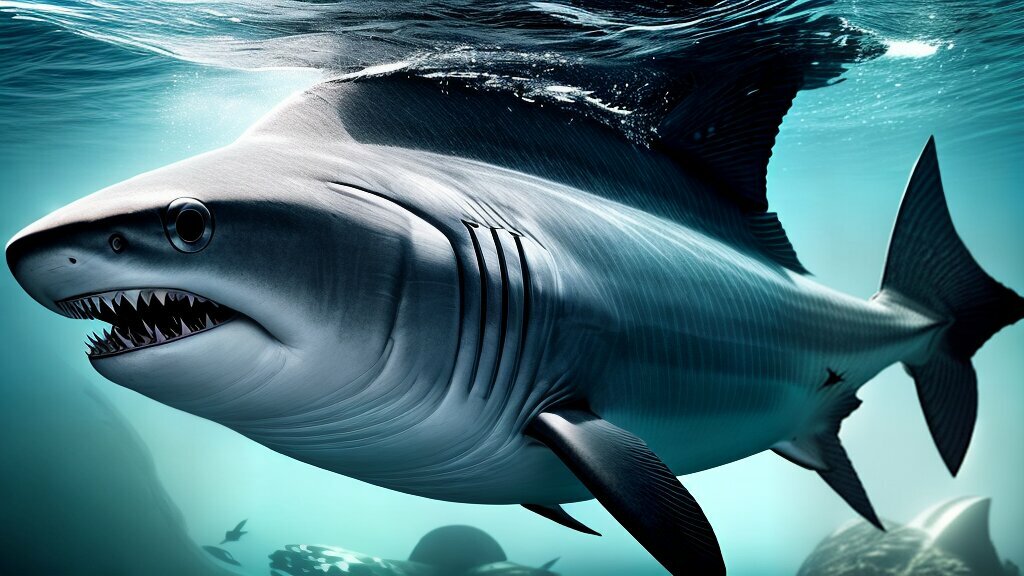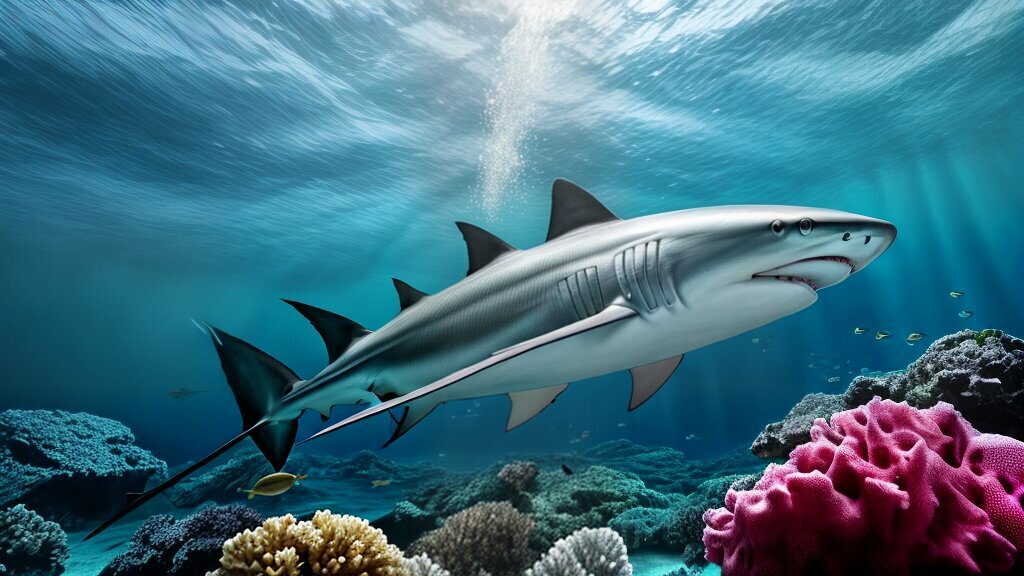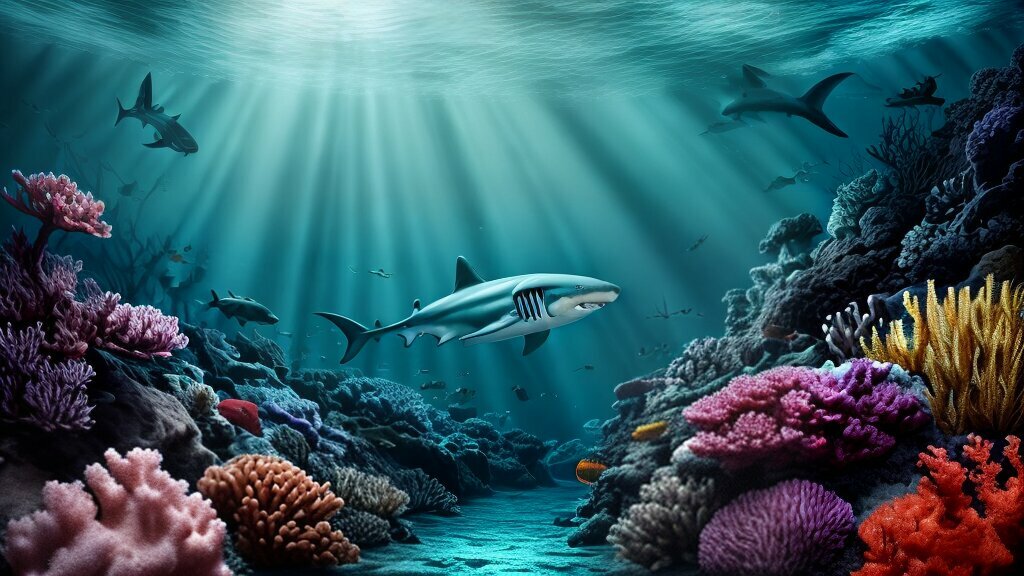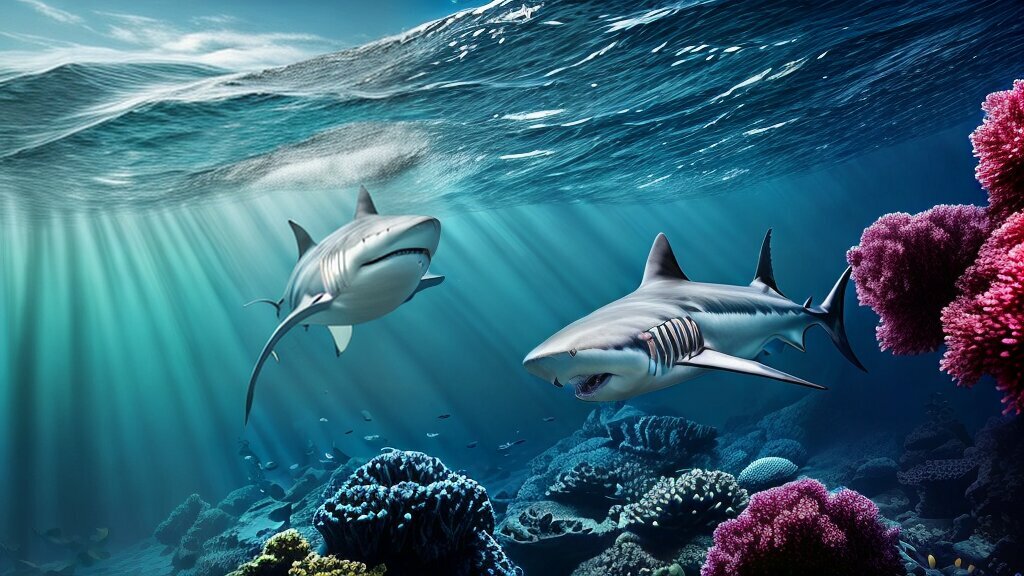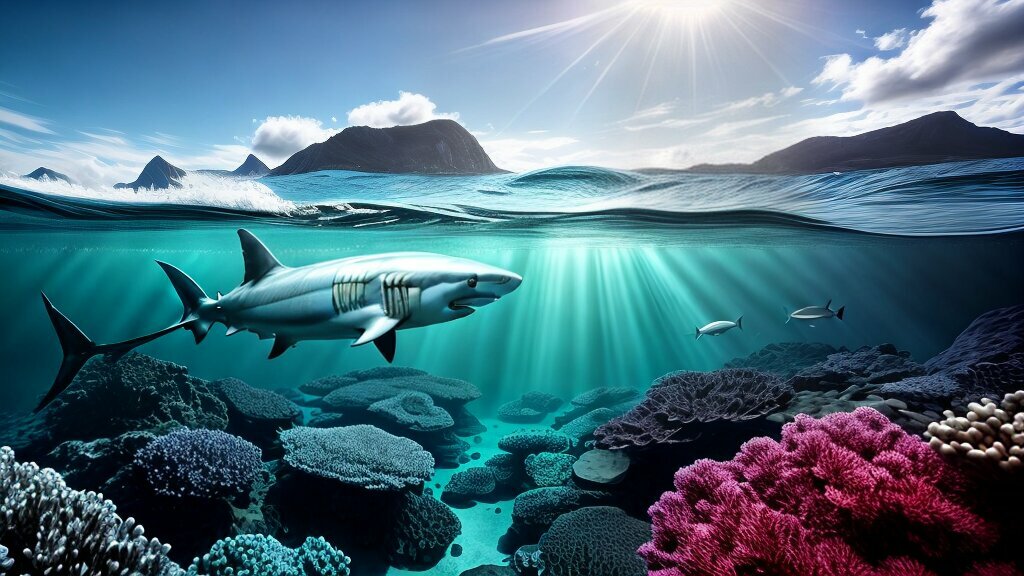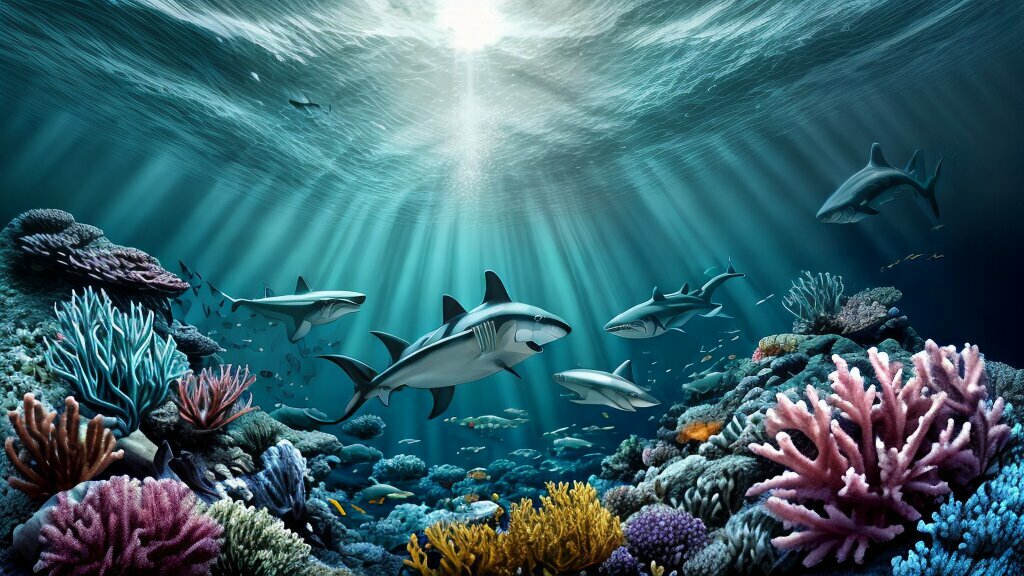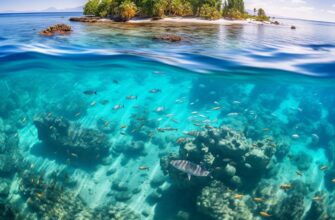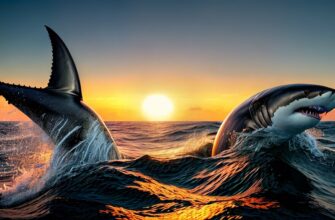Sharks have always been a source of fascination and curiosity for humans. These marine predators possess a number of remarkable adaptations that allow them to thrive in their underwater habitat. However, there is a common misconception that sharks drink water like humans do. This begs the question, do sharks actually drink water? Let’s dive into the world of shark behavior and physiology to uncover this mystery.
- Key Takeaways:
- Shark Physiology and Adaptations
- Shark Skeleton and Muscles
- Shark Diet and Hydration
- Water Sources in the Ocean
- Shark Thirst and Behavior
- The Importance of Water Conservation for Sharks
- Fascinating Shark Facts
- Conclusion
- FAQ
- Q: Do sharks drink water?
- Q: What are some unique adaptations of sharks?
- Q: How do sharks stay hydrated?
- Q: Where do sharks get their water from in the ocean?
- Q: Do sharks exhibit behavior associated with thirst?
- Q: Why is water conservation important for sharks?
- Q: What are some fascinating facts about sharks?
Key Takeaways:
- Sharks do not drink water like humans do.
- Sharks obtain the necessary hydration through their diet and physiological adaptations.
- The abundance of water in the ocean sustains marine life, including sharks.
Shark Physiology and Adaptations
Sharks are some of the oldest and most well-adapted species on the planet. Their unique physiology and adaptations allow them to survive and thrive in their aquatic habitat. One of their most important adaptations is their ability to extract oxygen from water through their gills, which allows them to breathe while underwater.
Sharks are also able to maintain their osmotic balance without the need to drink water. Unlike humans, who require a constant intake of water to replace the fluids lost through sweating and other bodily functions, sharks are able to conserve water through a combination of physiological adaptations.
For example, their kidneys are able to produce a concentrated urine, which minimizes the amount of water lost. Additionally, sharks are able to retain water by storing it in their tissues, such as their muscles and liver.
Another unique adaptation of sharks is their use of electromagnetic senses, which helps them locate prey in the water. Sharks have tiny, gel-filled pores on their heads called ampullae of Lorenzini, which detect electromagnetic fields given off by other animals. They also have an acute sense of smell, which they use to locate prey from miles away.
Shark Skeleton and Muscles
Sharks have a unique skeletal structure that allows them to move swiftly through the water. Their skeleton is made entirely of cartilage, which is softer and more flexible than bone, but still provides support and protection. This allows them to be agile and move quickly through the water to catch their prey.
Sharks also have a powerful set of muscles that help them swim. Their muscles are arranged in a series of S-shaped waves along their body, which allows them to swim efficiently and with great speed.
“Sharks are some of the most fascinating creatures in the ocean, with a range of adaptations that make them truly unique.”
Overall, sharks are incredibly well-adapted to their environment, with a range of adaptations that make them perfectly suited to life in the ocean. From their gills and ability to conserve water to their electromagnetic senses and powerful muscles, sharks are a true marvel of evolution.
Shark Diet and Hydration
While sharks do not drink water in the same way humans do, they obtain the necessary hydration through their diet and physiological adaptations. Sharks are carnivorous and their diet consists mainly of fish, marine mammals, and other marine creatures. These prey items contain a high percentage of water content, which is absorbed by the shark’s body.
One of the unique adaptations of sharks is their ability to extract water from their prey. As sharks tear into their prey, they are also able to absorb the water contained within their bodies. This process helps to meet the shark’s hydration needs without having to drink additional water.
It is important to note that not all sharks have the same diet. While some species primarily feed on fish, others may rely more heavily on marine mammals or smaller invertebrates. However, regardless of their specific diet, sharks are able to obtain the necessary hydration through the water content present in their prey.
Additionally, sharks have physiological adaptations that allow them to conserve water. Their kidneys are highly efficient and capable of excreting concentrated urine, which helps to retain water within the body. Sharks also have a thick layer of oily skin that helps to minimize the amount of water lost through their skin. This, coupled with their ability to extract water from prey, allows sharks to thrive in their aquatic environment without the need for drinking water.
Water Sources in the Ocean
Sharks are primarily found in the ocean and are constantly surrounded by water. The ocean provides them with a vast source of water, making it unnecessary for sharks to drink water like humans. Seawater contains salt, which can be harmful to most animals, but sharks have adapted to handle high levels of salt through their unique physiology.
Another source of water for sharks is through the prey they hunt. Many of the marine animals that sharks feed on contain high levels of water, which helps hydrate the sharks. In fact, some shark species can survive for weeks without drinking any water due to their efficient use of the water content found in their prey.
The ocean is home to a diverse range of underwater animals, which provides a variety of food sources for sharks. From fish to crustaceans, sharks have adapted to consume a range of prey to meet their nutritional needs. Without water, the ocean and its inhabitants would not exist, making it a vital component for maintaining marine life and the survival of sharks.
Shark Thirst and Behavior
Sharks, being highly adapted to their environment, do not exhibit behavior commonly associated with thirst. Their physiological adaptations allow them to conserve water even in the saltiest of seawater environments. Unlike other marine creatures, sharks are not in danger of dehydrating, thanks to their incredible adaptations.
Sharks have an amazing sense of smell and can detect prey from miles away. This sense allows them to locate prey without wasting energy or water. When hunting, sharks typically swallow their prey whole, including organs and blood, which are high in water content—so they get plenty of water with their food. Sharks, being apex predators, obtain all the necessary nutrients and water they need from their diet.
In addition, sharks have a unique ability to conserve water. Marine mammals, such as dolphins and whales, have to drink fresh water because they cannot extract water from seawater like sharks. Sharks, on the other hand, are osmoconformers, which means their internal salt concentration matches that of seawater. This allows them to maintain osmotic balance, so they don’t need to drink water like other marine creatures.
Overall, sharks are incredible creatures with unique adaptations allowing them to thrive in their aquatic environment. Their behavior and physiology allow them to obtain all the necessary hydration through their diet and conserve water effectively.
The Importance of Water Conservation for Sharks
Sharks are apex predators that play a crucial role in maintaining the balance of the ocean ecosystem. As with all marine life, access to clean and abundant water is essential for their survival. However, increasing pollution and climate change threaten the availability of water and pose an urgent threat to shark populations.
According to a study by the International Union for Conservation of Nature (IUCN), approximately one-third of shark species are currently threatened with extinction. The decline in shark populations can have far-reaching consequences, including disruptions to the food chain and destabilization of marine ecosystems.
Conservation efforts aimed at protecting water quality and preserving shark habitats are vital for the survival of these incredible creatures. Initiatives such as reducing plastic waste and implementing sustainable fishing practices can help to ensure that the ocean remains a healthy and hospitable environment for sharks and other marine life.
By supporting conservation efforts and advocating for sustainable practices, we can help to protect sharks and preserve the health of our oceans for generations to come.
Fascinating Shark Facts
Sharks are fascinating creatures with many unique attributes. Here are some lesser-known but interesting facts about them:
- Sharks have a sixth sense called electroreception, which allows them to detect electric fields in the water and sense the presence of prey.
- Some species of sharks can swim at speeds up to 60 miles per hour!
- The whale shark is the largest fish in the world, growing up to 40 feet long.
- Sharks have the ability to go into a trance-like state called tonic immobility when they are turned onto their backs.
- Sharks can lose and replace their teeth throughout their lifetime, with some species growing and shedding up to 50,000 teeth in their lifetime!
- The great white shark is known for its infamous feeding habits, but did you know that they often spit out their prey after taking a bite?
- Sharks have been around for millions of years and have survived five mass extinctions.
Did you know that sharks are actually immune to most diseases? Their immune system is so strong that it can even fight off cancer! Scientists are studying shark immune systems to develop new treatments for human diseases.
Sharks are incredible creatures that continue to fascinate and mystify us. By learning more about these apex predators, we can better understand and appreciate the diversity of marine life.
Conclusion
Sharks have long fascinated humans with their unique adaptations and behavior. However, the question of whether or not they drink water like humans has remained a mystery to many.
Through our investigation, we have discovered that while sharks do not drink water in the traditional sense, they obtain the necessary hydration through their prey and physiological adaptations. Their specialized gills allow them to extract oxygen from water, and their ability to maintain osmotic balance helps them conserve water.
Although sharks are highly adapted to their aquatic habitat and do not typically exhibit behavior associated with thirst, conservation efforts are crucial to protect these apex predators. Changes in the ocean environment, such as pollution and climate change, can impact the availability of water and affect the survival of sharks.
We hope that this article has provided valuable insights into the world of sharks and their relationship with water. Let us continue to explore the wonders of marine life and work towards preserving these magnificent creatures for generations to come.
FAQ
Q: Do sharks drink water?
A: No, sharks do not drink water like humans do. They obtain the necessary hydration through their diet and physiological adaptations.
Q: What are some unique adaptations of sharks?
A: Sharks have unique adaptations such as gills that allow them to extract oxygen from water and maintain osmotic balance without needing to drink water.
Q: How do sharks stay hydrated?
A: Sharks obtain water through their prey, which consists of a high percentage of water content. This helps meet their hydration requirements.
Q: Where do sharks get their water from in the ocean?
A: Sharks can obtain water through the seawater they swim in. The ocean provides abundant sources of water for marine life, including sharks.
Q: Do sharks exhibit behavior associated with thirst?
A: No, sharks are highly adapted to their environment and do not typically exhibit behavior associated with thirst. Their physiological adaptations help them conserve water.
Q: Why is water conservation important for sharks?
A: Water conservation is important for shark populations as changes in the ocean environment, such as pollution and climate change, can impact the availability of water and affect their survival.
Q: What are some fascinating facts about sharks?
A: Sharks possess incredible senses, unique hunting techniques, and there are diverse species of sharks. They are fascinating underwater predators.

